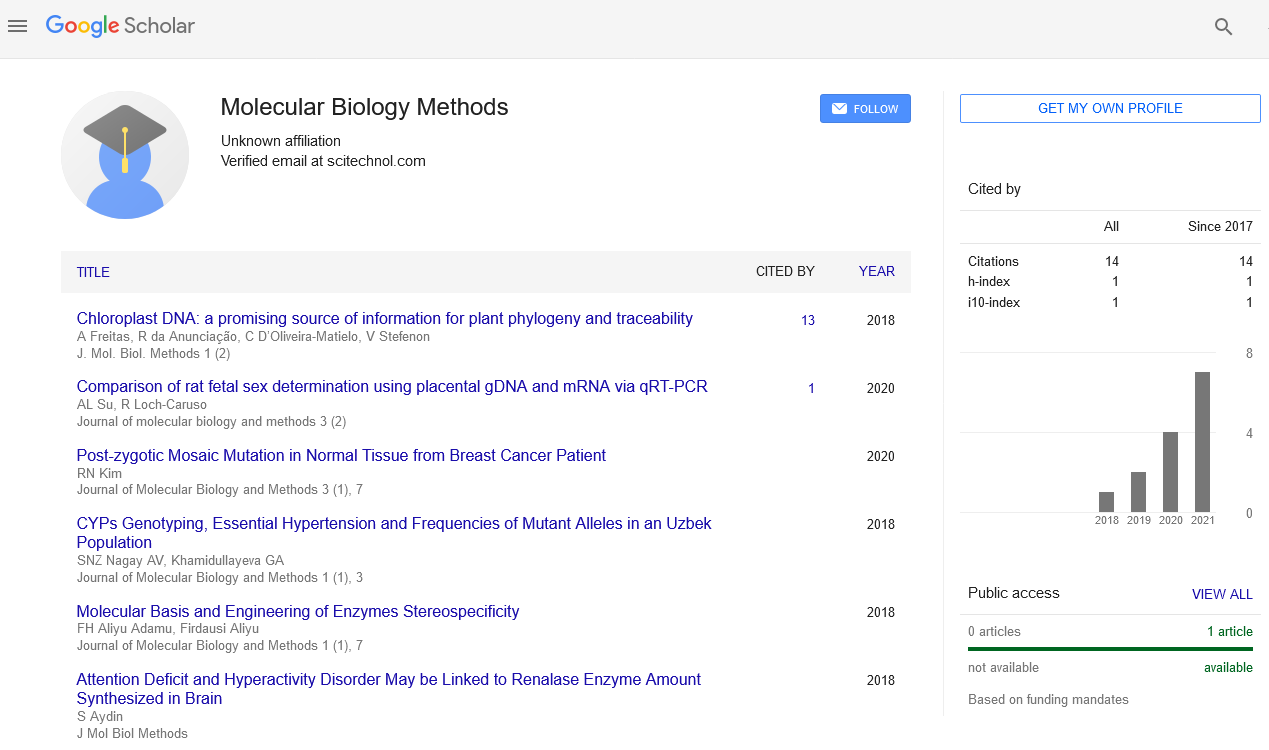Perspective, J Mol Biol Methods Vol: 7 Issue: 4
Molecular Cloning: A Key Technique in Genetic Research and Biotechnology
George Milt*
1Department of Biology and Medicine, University of Michigan Medical School, Ann Arbor, United States of America
*Corresponding Author: George Milt,
Department of Biology and Medicine,
University of Michigan Medical School, Ann Arbor, United States of America
E-mail: georgemilt@umich.edu
Received date: 25 November, 2024, Manuscript No. JMBM-24-154477;
Editor assigned date: 28 November, 2024, PreQC No. JMBM-24-154477 (PQ);
Reviewed date: 12 December, 2024, QC No. JMBM-24-154477;
Revised date: 19 December, 2024, Manuscript No. JMBM-24-154477 (R);
Published date: 26 December, 2024 DOI: 10.4172/JMBM.1000184
Citation: Milt G (2024) Molecular Cloning: A Key Technique in Genetic Research and Biotechnology. J Mol Biol Methods 7:4.
Description
Molecular cloning is a fundamental technique in molecular biology that allows scientists to isolate and replicate specific DNA sequences. This method has revolutionized genetic research, enabling the manipulation of genes, the study of gene function and the production of recombinant proteins. It involves the process of inserting a foreign gene or DNA fragment into a vector, which is then introduced into a host cell for replication or expression. The cloned DNA can be further studied, manipulated, or utilized in various applications such as gene therapy, drug production and agricultural biotechnology.
The process of molecular cloning begins with the isolation of the target DNA fragment. This can be a gene of interest or any other DNA sequence that the researcher wishes to study. The DNA is typically extracted from a biological sample, such as human, bacterial, or plant cells, using chemical or enzymatic methods. Once the DNA is isolated, it is then cut into smaller fragments using restriction enzymes, which act as molecular scissors. These enzymes recognize specific DNA sequences and cleave the DNA at particular sites, producing fragments with sticky ends that can be ligated to other DNA molecules.
Once the recombinant DNA molecule is formed, it is introduced into a host cell through a process known as transformation. In bacterial cloning, for example, the recombinant plasmid is introduced into competent bacterial cells, which are treated to make their cell membranes more permeable to DNA. The transformed bacteria are then cultured on a selective medium that allows only those cells that have taken up the plasmid to grow. This selection process is often facilitated by the inclusion of a selectable marker gene, such as an antibiotic resistance gene, which enables researchers to identify and isolate the transformed cells.
Molecular cloning has a wide range of applications in both basic and applied sciences. In genetic research, it has allowed for the detailed study of gene function and regulation. By cloning genes from various organisms, scientists can investigate the roles of specific genes in development, disease and metabolism. Cloning has also facilitated the discovery of new genes and their associated functions, leading to the identification of important disease-related genes and the development of diagnostic tests.
Advances in molecular cloning techniques continue to improve the efficiency and versatility of the method. For example, the development of high-throughput cloning methods allows researchers to clone many genes simultaneously, speeding up the discovery of novel genes and proteins. New tools such as CRISPR/Cas9 gene editing have also enhanced the ability to modify and clone genes with greater precision. These innovations have expanded the scope of molecular cloning, making it an even more powerful tool in genetic research, biotechnology and medicine.
In conclusion, molecular cloning is an important technique in molecular biology that has transformed our understanding of genetics and enabled numerous innovations in research and biotechnology. By providing the means to isolate, replicate and manipulate specific DNA sequences, molecular cloning has facilitated the study of gene function, the production of recombinant proteins and the development of genetically modified organisms. As technology continues to evolve, molecular cloning will remain an important tool for advancing science and improving human health.
 Spanish
Spanish  Chinese
Chinese  Russian
Russian  German
German  French
French  Japanese
Japanese  Portuguese
Portuguese  Hindi
Hindi 